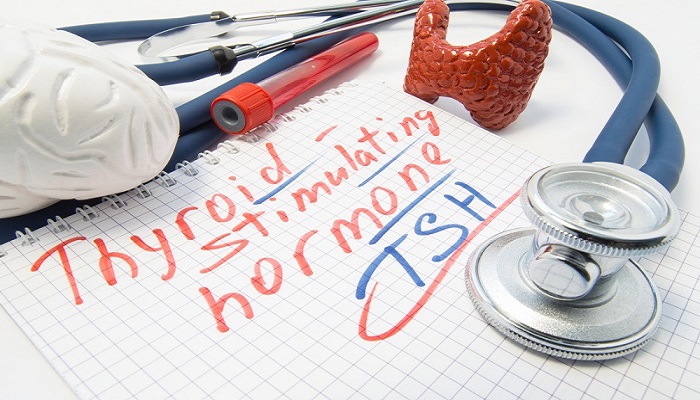The thyroid gland secretes hormones that modulate the body’s metabolism. The thyroid gland might become hyperactive or underactive during pregnancy. It is possible for both the mother and the baby to experience health issues due to an overactive thyroid in pregnancy. In contrast, an underactive thyroid in pregnancy can cause low birth weight and developmental delays in a child.
What Are Thyroid Hormones?

A butterfly-shaped structure situated at the neck’s front is the thyroid gland. Thyroid hormones aid in efficient energy use, maintaining body temperature, and the appropriate functioning of the brain and heart.
Calcitonin, Thyroxine (T4), and triiodothyronine (T3) are the three primary thyroid hormones.
The most important thyroid hormone is T3, responsible for regulating metabolism. Moreover, thyroid hormones play a role in many different aspects of health, including weight loss/gain, energy levels, heart health, and mood.
Within the brain, the hypothalamus and pituitary are responsible for controlling thyroid function. The brain releases the thyrotropin-releasing hormone (TRH). It piques the pituitary gland to produce thyroid-stimulating hormone (TSH). The hypothalamus and pituitary detect when:
- Thyroid hormone levels have dropped. Thus more TRH and TSH secret, stimulating the thyroid to generate additional hormones.
- Thyroid hormone levels get too high; hence the thyroid produces less TRH and TSH, resulting in decreased thyroid hormone synthesis.
However, this mechanism can be hindered by pituitary gland disease or tumours.
Thyroid hormones influence each body’s cells and organs. They:
- Control the pace at which calories burn, affecting weight loss or growth.
- The heartbeat can be slowed or sped up.
- It can raise or reduce body temperature.
- Affect how rapidly food goes through the intestinal system.
- Through medication, a doctor can control muscle contractions.
- Controlling the pace at which dead cells replace.
Understanding Thyroid Issues in Pregnancy

Thyroid disease influences the thyroid organ. There are a few thyroid illnesses, including hypothyroidism, hyperthyroidism, and goiter. Moreover, the condition can prompt a scope of manifestations. In addition, signs and symptoms vary from person to person. And, It can affect normal thyroid levels in pregnancy. Moreover, With hypothyroidism, a woman may face anovulatory periods with unopposed oestrogen activity causing Adenomyosis or Bulky Uterus, which may over-expand the blood supply causing bleeds, blood clots & necrosis.
Important Role Of Thyroid Hormones In Pregnancy

Pregnancy is a stage when a woman’s body experiences massive changes. Many hormones collaborate to assist the baby’s development and growth. One important group of hormones is the thyroid hormones which helps in a development of a child. So during this time, women think of ways to control the thyroid during pregnancy.
Thyroid hormones are vital for brain and nervous system development throughout the first trimester of pregnancy. The baby is dependent on your hormones, which get delivered through the placenta. The fetus’ thyroid gland begins to create its thyroid hormones about the 12-week mark.
However, if the thyroid gland is not working correctly, it can lead to a condition known as hypothyroidism. So symptoms of hypothyroidism include fatigue, weight gain, and constipation.
Moreover, a deficiency in thyroid hormones can result in miscarriage, congenital disabilities, and premature birth.
Due to greater thyroid hormone levels and other indications that arise in both normal pregnancy and thyroid pregnancy, thyroid issues could be harder to diagnose during pregnancy.
Certain hypothyroidism signs are more obvious, prompting your physician to examine you for thyroid disorders.
Symptoms of Thyroid in Pregnancy

Hyperthyroidism during pregnancy slow-downs the activities of every woman. Due to thyroid, it is challenging for women to get pregnant. However, In some cases, women get pregnant with thyroid disease. In this situation, a mother thinks about managing thyroid during pregnancy. But a mother must take special care of her child, which leads to the good health of both mother and baby. The mother must correct doctors’ suggestions with appropriate medicine to avoid hyperthyroidism.
However, it is tough to detect the thyroid during pregnancy, but some symptoms will provide you with the signs to cure the diseases quickly.
All these symptoms are described below.
- A pregnant woman feels an increased heartbeat with a thyroid problem.
- However, sometimes the woman also feels sensitivity to hot temperatures.
- Besides this, fatigue and trouble in sleep also seem in the pregnant lady.
- During pregnancy, women generally have vomiting, but if a pregnant woman has a thyroid problem, then severe vomiting occurs.
- The pregnant lady feels nervousness which is an excellent symptom of hyperthyroidism.
- Moreover, a pregnant woman’s weight unexpectedly loses, and the women do not gain weight for pregnancy.
- Some pregnant ladies also feel shaking hands for hyperthyroidism problems.
- Higher blood pressure is also a symptom of hyperthyroidism.
- In many cases, premature birth may occur due to the thyroid during pregnancy.
After knowing all these symptoms, a pregnant lady must start her treatment. The proper treatment helps to recover the thyroid problem quickly. Besides this, many pregnant ladies also think about “how to decrease thyroid levels during pregnancy”, so the best way is to consult a good doctor.
What are the Important Causes of Hyperthyroidism During Pregnancy?

Before knowing how to control TSH in pregnancy, let’s first understand the cause of hyperthyroidism in pregnancy. The severe disease is the first cause of hyperthyroidism. However, in every 100 pregnant women with thyroid, may 1 to 2 have the severe disease. Moreover, Grave disease is an immune disorder that develops antibodies in pregnant women’s bodies. These antibodies create more thyroid hormones in pregnant women. Mostly these antibodies are called TSI.
When a woman is impregnated, the grave disease starts with it. The second trimester for the woman is critical if she previously had a severe condition. In the first case, some parts of the immune system decrease their activeness, and then the pregnant woman’s immune system gets less TSI. In this stage, severe disease symptoms in a pregnant woman increase.
Moreover, in the first few months of delivery of the baby, the chances of severe disease increases Therefore the doctors are prescribing to test thyroid levels regularly during pregnancy. In many cases, hyperthyroidism also causes much harm to the baby and mother. Some symptoms like super nausea and vomiting help you detect the severe disease easily. Besides this, a higher HCG level also causes thyroid in pregnant women.
A higher level of HCG develops thyroid hormone and is also helpful in this hormone’s growth. This cause shows in the second half of your pregnancy. However, many nodules and lumps in your thyroid gland also cause hyperthyroidism in the case of pregnant women. Furthermore, women with PCOS/PCOD problem have higher thyroid antibodies (such as TPO antibodies) and are more likely to have a goiter (enlarged thyroid gland).
How Do Doctors Diagnose Hyperthyroidism in Pregnancy?

A woman needs regular checkups from doctors to find ways to control thyroid during pregnancy. However, to diagnose hyperthyroidism, doctors mainly prescribe blood tests. The blood test report helps see the thyroid hormone level in a pregnant woman’s body. Besides this, doctors also see the antibodies in the body to diagnose grave diseases. However, to check the thyroid function in the body, different blood tests are prescribed by doctors, such as thyroid-stimulating hormone tests, T3, T4, and thyroid antibody tests.
At Mishka IVF, we first test the TSH level. If you have a high TSH level, you can suffer from hyperthyroidism. Moreover, your thyroid gland cannot correctly create more hormones at a higher TSH level. However, the higher T4 level can cause illness in the pregnant woman. However, it is critical for asthma and skin disease patients to take medicines for their health problems. Due to these medicines, the T4 level increases, and people get hyperthyroidism. The T3 is somehow equal to T4. But the antibody test describes the severe disease in the case of the pregnant woman. Mainly our immune system attacks the thyroid gland and increases thyroid antibodies rapidly. It causes hyperthyroidism in the case of a pregnant woman.
What are the Possible Effects of Hyperthyroidism on My Child and Me?

Hyperthyroidism has many harmful effects on mother and child. A pregnant lady who suffers from a thyroid problem can give birth to a premature baby. In critical conditions, the baby is born before the delivery day( 37 weeks earlier). Hyperthyroidism hurts the child. The newborn’s weight is lower. Besides this, the thyroid increases pregnant women’s blood pressure, which leads to complications during delivery. Hence, it is essential to know how to control the thyroid during pregnancy.
Moreover, if a pregnant woman has a thyroid storm, she gets life-threatening problems in delivery. In these cases, the increasing rate of thyroid hormone in pregnant women’s bodies causes problems like high fever, decreased heart rate, and dehydration. Besides this, some ladies also get diarrhea, the rapid function of the heart, which can cause death. Therefore a pregnant woman must learn “how to control the thyroid during pregnancy naturally”.
The baby also suffers from different effects of this disease. If a lady has a grave illness, the child gets Neonatal Graves’ disease. But it seems in significantly lower cases. But due to hyperthyroidism, the newborn may need hospitalization. In extreme cases, hyperthyroidism in the case of the newborn is fatal. But in lower chances of this disease, the babies temporarily suffer from this problem and recover after some time.
In some cases, the severe disease affects the newborn, creating many health problems afterwards. During pregnancy, the treatment taken by moms has a temporary cure to the baby. But this disease needs a permanent solution, to give birth without any problem.
What are the Treatment Options for Pregnant Women during Hyperthyroidism?

You will get all the answers if you have a question, “how to prevent thyroid in pregnancy?” here. In the first stage of your pregnancy, you must visit the doctors to manage your thyroid problem. Many antithyroid medicines will help you control the thyroid hormone in your thyroid gland. But if you have mild hyperthyroidism, you do not require much treatment. You only adopt some treatment to avoid vomiting during pregnancy.
Antithyroid medicine helps the baby, protecting the baby’s bloodstream from entering the thyroid hormone. Therefore you require an expert endocrinologist who provides you with proper doses of medication to prevent this disease before affecting your baby. Most doctors prescribe two types of thyroid medicines, one is PTU and another is methimazole. PTU medicine is given to pregnant women during the first three months, and methimazole is provided after three months. However, methimazole medicine has some side effects, so many doctors avoid prescribing this medicine to pregnant women. Moreover, the woman does not require any medication after completing their first-trimester journey.
Additionally, these antithyroid medicines also help your child to prevent the disease. A small amount of medicine goes to the baby, and excessive thyroid hormone secretion decreases. However, the pregnant woman gets some side effects after taking thyroid medicine.
What are the Side Effects Of Thyroid Medicine?

- The pregnant woman gets rashes and itches all over the whole body.
- In some cases, the production of white blood cells in the body decreases, decreasing the body’s power to fight infections.
- In some rare cases, liver failure also occurs due to antithyroid medicine.
After taking the antithyroid medicine, you must call the doctor immediately if you feel fever, sore throat, yellowing skin, and pain in the abdomen. Besides this, if you feel tired and weak, you must visit the doctor. In some cases, the doctor also advises surgery. The doctor removes the thyroid gland’s part to cure a pregnant woman in this surgery. A pregnant lady should have surgery in the second trimester of pregnancy.
Can I breastfeed while taking beta-blockers, thyroid hormones, or antithyroid medicines?

Many pregnant women think it is acceptable to feed the baby when continuing antithyroid medicines? The answer is yes because several antithyroid drugs are safe and cannot harm your child’s health. A small portion of this medicine goes through breastfeeding to the baby. The proper amount of thyroid medicine cannot affect the child anyway. Therefore doctors always advise the patient not to take more than 20 milligrams (mg) of methimazole or, less commonly, 400 mg of PTU. The beta-blockers and thyroid hormones do not affect the baby more, so you can breastfeed your baby when taking these medicines.
Conclusion
Some women think about how to control the thyroid to get pregnant; therefore, you require high iodine foods, which helps your body create more thyroid hormones. A pregnant woman can get a lot of iodine when she starts a diet. Your baby also consumes iodine from the diet. You require eating dairy products, seafood, meat, egg, and iodized salt during pregnancy. Similarly, a mother needs a good percentage of iodine at breastfeeding. The iodine supplement helps a mother to prevent her child from thyroid disease.
Besides this, go for regular checkups and understand how to control thyroid during pregnancy.
FAQ’s
Q1. How can I control my thyroid during pregnancy?
Ans. Thyroid specialists recommend to take 2 doses of thyroid medication every week. However, You should first consult with your doctor ASAP when you get aware that you are pregnant. Your doctor is going to take some tests of your thyroid hormone levels every 4 to 6 weeks for 1st half of your pregnancy , and once after 29 to 30 weeks.
Q2. What is the normal thyroid level during pregnancy?
Ans. The Endocrine Society recommends that person should be maintain there TSH levels between 0.2-<2.5 mU/L in the first week of your pregnancy and between 0.3-3 mU/L during remaining trimesters.
Q.3 Can thyroid patients drink milk?
Ans. Drinking milk or eating other calcium-rich foods less than 4 hours before or after taking levothyroxine may reduce the absorption of the drug and lowers its effectiveness.
Q4. What happens if TSH is high during pregnancy?
Ans. We found that pregnant women with higher TSH levels had an increased risk of miscarriage in their early phase of pregnancy. In fact, TSH levels between 2.5 to 4.87 mIU/L increases the risk for miscarriage, with TSH higher than 4.87 mIU/L is a severe risk even further.

